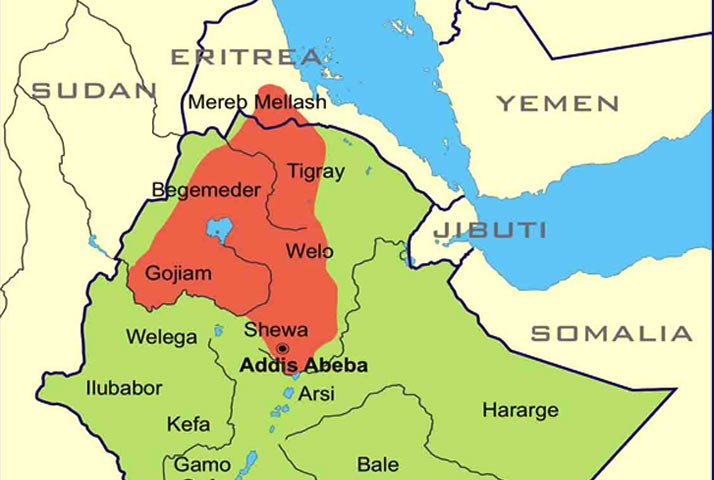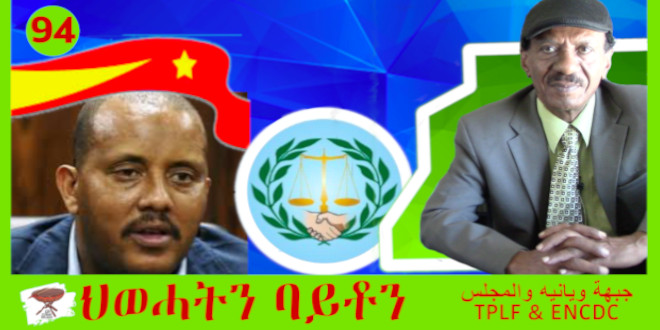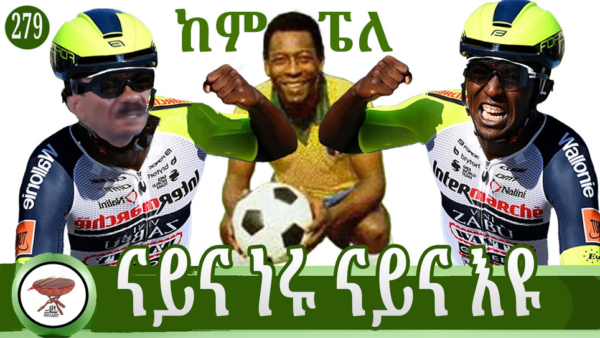What Ethiopian-Eritrean “Friendship” ?

(This is a speech delivered on Saturday, March 26, 2011, at a conference organized by the Eritrean Ethiopian Friendship Forum in San Jose, California: “Ethiopia & Eritrea: Healing Past Wounds and Building Strong People-To-People Relationships.” March 27, 2017)
One night a man came upon a child who was searching under a street lamp for a coin he lost. After a while the man asked him if he was sure he lost it there. The child said, “No. I lost it over there.” And he pointed with his finger to a distant place. The surprised man asked, “Then why don’t you search for it there?” The child looked even more surprised, and said, “You can’t tell! There is no light where I lost it!”
I will return to this anecdote at the end of my speech.
Dear organizers, I would like to thank you for giving me this opportunity to speak at this event. And I thank all the respected guests and panelists for attending.
People search for something because they lost it or never had it. I am sure the organizers of this event are convinced that we need to establish, reestablish, or repair the friendship between Eritrea and Ethiopia, or more precisely, between Eritreans and Ethiopians. And my first attempt is ….
Defining Friendship
There are many noble initiatives undertaken in the name of “friendship.” And some that are not so noble. Friendships undertaken to introduce people to one another, people who had no reason to know one another, are noble. For example, campaigns by cities to adopt each other as “sister city” or campaigns by schools for “student exchange” are noble and I am all for them. There are also friendship campaigns to reconcile two feuding parties—and these may begin by having people verbalize their grievances. I am all for that; and “reconciliation” has been a mantra of mine forever.
What I have a problem with are those “friendships” that are organized by people who are in the business of creating and exacerbating conflicts, just so they can be the permanent friendship brokers. And when we talk about creating a friendship between Eritreans and Ethiopians, we really have to make sure that we are engaged in the noble kind of campaigns, and that we do not fall prey to the brokers who are incentivized to make a lucrative career out of “friendship events.”
As many of you might know, I have been vocal in opposing the so-called friendship projects—blame it on the NGO factor. There are many Dellalas brokering such projects, and one has to be careful. Therefore, the first thing I asked when I received the invitation to give a speech was: who is funding it? I made my decision to attend only after I was assured that this is a self-funded event. Then I began to ask myself a few questions: Is there a need for such an event? Did we have friendship that somehow we lost and we are trying to regain it? Did we have enmity that we want to replace with friendship? What would change if we kissed each other in this hall? Would we say that we have achieved our goals of establishing friendship? (Excuse me, it seems I was stung by the Isaias bug, I find myself throwing so many questions)
My objective is to present a speech from a different perspective. I want to provoke the audience to think differently—and if I achieve a fraction of my expectation, I would be content.
There is no doubt that the organizers and the audience are anxious members of our society; they are people who are so sick and tired of what is happening in the Diaspora—my disappointment is that they mistake it for a reflection of what is happening in our countries—and such mistaken extrapolation, is leading us to a wrong conclusion.
At times, even those who seem to embrace the diversity of our population fall in the trap of wrong conclusions. They assume that there are two monolithic Ethiopian and Eritrean nations and they make generalized statements—for example, the assumed enmity between Ethiopians and Eritreans! Of course, there is enmity; but that is only a tiny fraction of the reality: the fraction of our population that has become mortal enemies, but it is just a fraction.
What accounts for our enmity, if there is any? If we are to avoid the trap of the professional brokers, we need to identify them. In my view, there are some that are a result of what we Eritreans call “Ethiopian occupation”; there are some that are a result of intra-Abyssinian power feud—a conflict that doesn’t address the majority of Eritreans or Ethiopians—and then there are some that are based on second or third-hand information of people who basically don’t know one another. And I will explain the…
Occupation-Related Enmity
My first visit to Ethiopia was in 1991; with what I grow up experiencing, and hearing, that trip was not easy—I had to stay in Cairo for two weeks to decide if, after all, I want to go to Eritrea via Addis Ababa. I had traveled to Cairo on my way to Khartoum from where I had planned to travel to Eritrea by road. I carried an Ethiopian passport (albeit with a fake name) and I didn’t think I needed a transit visa for Sudan; but at that time, Egypt and Sudan were at the brink of a battle over Halaib; and an Egyptian immigration officer said I cannot board a plane to Khartoum without a visa. I discovered the only option left was to fly through Addis Ababa; and those who advised me to do so, travel on Ethiopian Airlines, could have been telling me to go to meet my death. I said to myself now Saleh, you will become a martyr, and you will die in Ethiopia, someone will just cut you into pieces.
I convinced myself I was brave enough and decided to face the monster called Ethiopia in its den, but my knees went limp and I was sweating when I landed at Bole Airport. I found a taxi and I said, Hilton, pretending to know the city; not because I could afford the Hilton, but because I assumed it has to be the only safe place in Ethiopia. The taxi driver must have been thinking ‘mn aynet fara netch ychchi’ and dropped me at the entrance of the Hilton. Without being asked he said, the fare is $100. I reached for my wallet and paid, no questions asked, after all, he brought me there in one piece. That evening I called a friend and I told him the story; and if it was not over the phone, he would have killed me. The Ethiopians didn’t kill me, thus far, but I thought my Eritrean friend would do the job. I checked out of the Hilton the next day and took a room at Ghion for a fraction of the Hilton rate. By then I discovered the taxi fare from the airport was only $20 birr—now the Ethiopians here owe me $100 dollars and they have to pay it before we talk about any friendship!
It was in Addis Ababa that I began to ask myself: why do I fear and suspect all Ethiopians? I couldn’t find a convincing reason for that, but prejudice (though I can justify that prejudice with conviction.) Those who showed me darkness in broad daylight with their oppression are responsible for their deeds. But simply because they were Ethiopians doesn’t implicate the rest of Ethiopians in any way. I also realized that an Ethiopian farmer in Shoa or Gondar did not oppress me; he was oppressed himself by the same oppressor. But understandably, to most Eritreans, it was the Amhara oppression, in absolute terms—and that was the cause for my fear and suspicion—I descend from a people who had seen nothing in their history with Abyssinia except killing, oppression, uprooting, humiliation, and disenfranchisement.
But with all of that, I found in Abyssinians a copy of myself, of my culture, of my language and of my heritage. And that is why I am asking today if I need to be friends with ordinary Ethiopians. Of course, I do—and I came to that conclusion on my own, long ago, without meetings, or resolutions or declarations. I can point to a few Ethiopians in this room whom I consider friends, and I have developed other friendships in Ethiopia; since my first ever trip in 1991, I went to Ethiopia no less than 15 times; I stopped traveling when they switched the street lamps off, in the street of Badme—THAT village!
Since that brutal war, I went to Ethiopia only once—remember, I have many relatives who suffered from the repercussions of the war, and deported, humiliated, destroyed— yet, I would like to visit Ethiopia as much as I can. But that doesn’t change my views: I like to live today without forgetting yesterday. And that is the problem that I see with the Abyssinian elite—their slogans and declarations could be well-intentioned, but not deep enough, I mean not deep at all. They forget yesterday and they are too self-centered, they espouse narrowly defined wishes, ill-defined wishes. And I pity those who are obsessed with reclaiming Eritrea that they consider a mere piece of real estate. I wish they realize that Eritrea is not Ethiopia and it is high time that they come to terms with that reality. The fact that Eritrea is being brutalized by Isaias doesn’t change anything. I believe we can live as neighbors, and let the future take its natural course. And if there comes a time when the entire region would unite, let alone Eritrea and Ethiopia, then be it. But not the arrogant attitude of ‘we will retake Eritrea’—though fortunately enough, such romantic views that were espoused since the imperial era are fading away fast. That is positive.
I, as an Eritrean, was oppressed by Janhoi. But so was Shaleqa Dawit who was jailed in a basement of a villa—I think it was in Embatkala—by Janhoi’s security, in Eritrea when he was much younger. How can I blame Ethiopians at large when they, too, were being victimized by my victimizer? Was the Derg rule cruel to Eritreans? Yes, it was, but it didn’t spare Ethiopians either.
Ordinary people have no share in all this sin! I came to learn that I have no enmity to Ethiopians, but only to those who were in power, the same people who were brutalizing my Ethiopian brothers and sisters just like they were brutalizing Eritreans. That should not make us forget that there are some Eritreans who have a deep-rooted suspicion of anything Ethiopian due to past experiences that we never reconciled, or put closure to. But still, all of that is not the kind of suspicion that would lead us into battle to spill each other’s blood. It is just fear and precaution caused by our history, which only time will heal. What needs to heal fast is the….
Enmity Based On Intra-Abyssinian Feud
If you tell Abyssinians, from both countries, to close their eyes and visualize Eritrea and Ethiopia, they would most probably float on a specific landmass, the highlands, a strip that runs from central Eritrea to Addis Ababa—the region that the immortal song of the late Telahun Gessese defined as “Asmera Addis Ababa, shi kilometer naw’eee…”
That region is approximately 20% of the total area of the two countries, and it is home to around the same percentage of the population. Unfortunately, many of the Abyssinian elite would most probably not see the rest of the 80% land and people in Ethiopia or Eritrea when they close their eyes and imagine the region. Why do I bring that?
I bring that because I do not believe in building a house from the roof down, but from the foundation up. If one is not at peace with himself, he will never be at peace with others. This applies relatively more to us Eritreans, we are not at peace with ourselves—thanks to an oppressive regime that hinders us from achieving closure. That is why our country is a record holder for igniting wars, and that is why the conquering regime in Asmara has militarized the entire nation.
This intra-Abyssinian feud of kings and conquerors has been immortalized in songs and poems and books, but I have some news for you: it has nothing to do with the majority of Eritreans and Ethiopians. For the non-Abyssinian sections of our population, it might as well be the story of cowboys and Indians. It had nothing to do with them. One side defeating the other made no changes to their lives.
Unfortunately, I have to say this is the one that occupies the minds of most of the peace brokers who always find a way to tell us that “Meles and Isaias are cousins,” or some variation of that. Their focus is entirely the Telahun Gessese defined Ethiopia and Eritrea. Non-Abyssinian Ethiopians and Eritreans of other sects and groups have nothing to do with the enmity that has been prevalent in Abyssinia for too long. What is there between a Beni-Amer and an Oromo? What enmity is there between a Harreri and a Somali in Ethiopia and a Blin, Mensae, Saho speakers or Jeberti in Eritrea? What is there between an Eritrean Muslim and an Ethiopian Muslim in general? Nothing. Nothing at all. Check around you, all the quarrels and hate in the USA are between Ethiopians and Eritreans of Abyssinian extract.
Eritrean elite and Ethiopian elite were praying together in one church; after the border war of 1998, they decided to have two separate churches, to pray to the same God, with the same church doctrines and language, in two different churches. And this is further proof why I believe the friendship you are talking about concerns Abyssinians only because it is Abyssinian in nature. If we further dissect that, it is the Abyssinian elite, predominantly Tewahdo, who did not want to rub shoulders with each other, even when they pray. And now, I am afraid, those who are bleeding their hearts for this kind of friendship are all Abyssinians, and they are predominantly Tewahdo. Why are the Muslims praying in any mosque regardless of the nationality of the congregation? My friends, these are the causes that are hindering the friendship—face them head-on.
I am boldly stating that the hate that you are talking about is your own making—call it inter-Habesha reconciliation–or more precisely, inter-Habesha elite reconciliation. Don’t pretend that there is hate between the ordinary people that we can transform into a friendship from our adopted homes in the West.
For me, this is of great concern because first, I am a Habesha, an Abyssinian; and second, Tewhado is the faith of half of my compatriots; Tewahdo is an Eritrean heritage, and therefore, it is my heritage. Its status concerns me like any other Eritrean—because the problem that half my country faces, immediately becomes my problem. And what follows is another enmity, the…
Enmity Based On Ignorance
There are sections of Eritrea, and segments of Ethiopia who, due to geography, never got to interact with one another. They are strangers to each other. A friendship campaign, an attempt to introduce these people to one another would indeed be noble. It is friendships for the rest of us: the Kunama to be introduced to the Gambella; the Harreri to the blin; the Saho speakers to the Sidama, the Wellayta, Ben Shangul, the Oromo, the Gurage, the Nara, the Habab, Marya, Saho speaking tribes, Hadendwa and so on—of course, I can’t possibly name all eighty-something groups of Ethiopia here. This kind of venture would expand the base of friendship—it would be truly “people to people.”
Instead of presenting history as that of the victorious conqueror that has always been elevated to mythological proportions; and the history of the vanquished and conquered, that has been relegated to the sidelines, mercilessly ignored, and made to disappear slowly from the collective memory of the people; it could become a story of anthropology.
I grew up loving history (maybe because it doesn’t involve math), and I found it to be continuous non-abetting heartburn. I get this heartburn whenever I read or hear the perpetuation of the mutilation of history, that is always told from the political perspective of the victor, as a perpetual political tool to ascertain the superiority of the victor, even if that victory happened centuries ago; while stressing on the inconsequential nature of the vanquished, as if it is current events. I wish scholars would help us reconcile this history; we just cannot afford to live in such kind of ignorance forever. That is why I think our history is crying for closure—I have a lot of admiration for people Like Prof. Lapiso Dileba.
Ordinary Ethiopians and Eritreans are decent, peace-loving and respectful people; we make a mistake when we assess the situation at home with our individual situation in the West. We all know that Europe or America is not a Zoba of Eritrea or a Kilil of Ethiopia. Our hyphenated situation is not representative of the situation at home; but in our confusion and self-absorption, we want to impose our choice on them. Whether Eritrea or Ethiopia should have an American style capitalist government or a Swedish like socialist government, is our selfish concern, not our peoples’ problem. Of course, we should help them choose—that would be showing our concern; but we should not try to impose, or think we have the right to force our choice on them. We can help in promoting universally accepted rights and values: good governance, respect for human rights, respect of the rights of women and children, and why not, even the rights of animals that are much abused in our countries. But we should be careful of our arrogant attitudes and looking down on our own people.
To conclude, in my view, the enmity between Eritreans and Ethiopians is of three kinds: there is one that is the outcome of one country occupying another. This will heal with time and as people come to learn, as I did 20 years ago, that the cause of my misery was not an entire population but a ruling elite. There is enmity based on prejudice: of people who never interact with one another. I wouldn’t even call this enmity but ignorance and lack of awareness. And this can be solved, over time, with noble initiatives to introduce people to one another’s culture. There is a lot that the elite can do in this regard: writing books, producing videos, writing articles, etc. Of course, this will re-teach us what we already know: that we are people who share the same values and people who have the same concerns. Then there is the third cause of enmity, which is the intra-Habesha feud. And because, for whatever reason, it is the Habesha of Ethiopia and the Habesha of Eritrea who has been at the helms of power, this feud has become an Eritrea-Ethiopia conflict.
In all of the three kinds of enmities, I submit to you that the professional brokers, the Dallalas, have nothing to contribute that we can’t do on our own. Their only contribution would be to institutionalize the conflict and create their own satellite brokers who would have a vested interest in perpetuating the conflict. We have enough able people who could do the job a thousand times better than an expatriate solely imported from the West to resolve our conflicts for us. We should not allow ourselves to be insulted.
So, finally, which section of the Ethiopian and Eritrean people needs to be friends? Is it all of the 80 million Ethiopians and 4 million Eritreans?
What I am saying here is that unfortunately, you are looking for your lost coin under a specific place simply because that place is lighted, not because that is where you lost your coin. I believe the problem is not framed correctly; the ordinary people do not need your help to become friends. The feud and conflict is elite and, mostly Diaspora-based and I strongly suggest that it be framed as such.
Thank you.
Saleh “Gadi” Johar is the founder and publisher of awate.com; activist; author ‘Of Kings And Bandits‘ and ‘Simply Echoes.’




Awate Forum